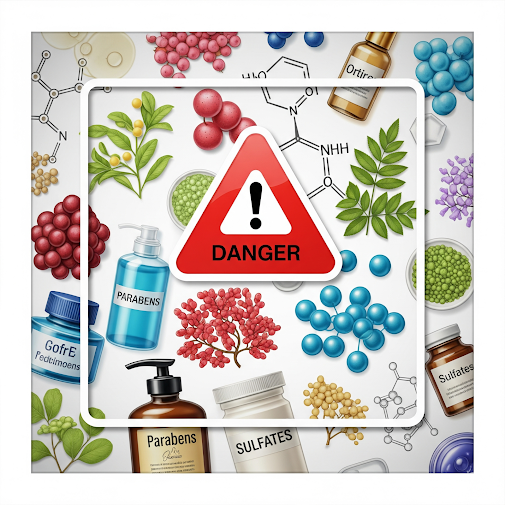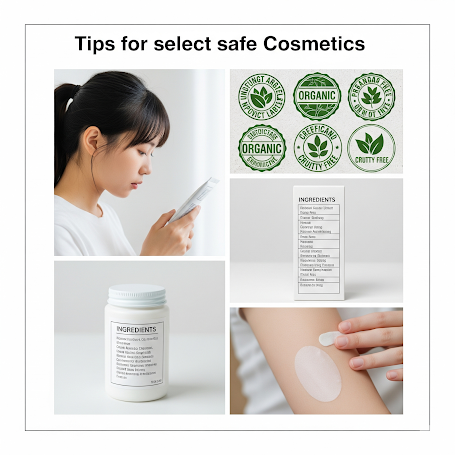Table of Contents
1. Understanding Cosmetic Ingredients
Choosing safe and effective cosmetics requires understanding their ingredient lists. While it can seem daunting, learning how to analyze these lists can empower you to make informed decisions about what you put on your skin.
2. How to Analyze Ingredient Lists
Cosmetic ingredient lists are typically ordered from the highest concentration to the lowest. This means the first few ingredients make up the majority of the product. Here's how to approach analyzing them:
- Focus on the First Few Ingredients: These are the most dominant in the product and often determine its main function.
- Recognize Common Ingredient Types: Familiarize yourself with common ingredient categories like water (aqua), solvents, emulsifiers, preservatives, and active ingredients.
- Pay Attention to Allergens and Irritants: If you have sensitive skin or known allergies, carefully scan the list for potential triggers like fragrances, dyes, and certain preservatives.
- Look for Specific Active Ingredients: If you're targeting a specific skin concern, identify the active ingredients known to address that issue, such as retinol for anti-aging or salicylic acid for acne.
3. Ingredients to Look For
Certain ingredients are known for their beneficial properties and are generally considered safe:
- Hyaluronic Acid: A powerful humectant that attracts and retains moisture, hydrating the skin. (Comfort Zone)
- Ceramides: Lipids that help restore the skin's natural barrier, preventing moisture loss and protecting against irritants. (Comfort Zone)
- Glycerin: Another effective humectant that draws moisture to the skin.
- Antioxidants (Vitamin C, Vitamin E, Green Tea Extract): Help protect the skin from environmental damage caused by free radicals. (Synergie Skin)
- Niacinamide (Vitamin B3): Can help reduce redness, improve skin tone, and strengthen the skin barrier. (Synergie Skin)
4. Ingredients to Be Cautious Of
Some ingredients have been linked to potential health concerns or skin irritation:(Safe Cosmetics)
- Parabens (e.g., butylparaben): Used as preservatives, some studies suggest they may disrupt hormone function.
- Phthalates: A group of chemicals that may be endocrine disruptors.
- Formaldehyde and Formaldehyde-releasing preservatives: Known carcinogens and skin irritants.
- Fragrance: A common cause of skin irritation and allergies. Opt for fragrance-free products, especially if you have sensitive skin.
- Sulfates (e.g., Sodium Lauryl Sulfate - SLS, Sodium Laureth Sulfate - SLES): Can be harsh and irritating, potentially stripping the skin of its natural oils.
5. Tips for Choosing Safe Cosmetics
Here are some practical tips for selecting safer cosmetic products:
- Read Labels Carefully: Always check the ingredient list and be wary of vague terms like "fragrance." (aetheion)
- Look for Certifications: Some certifications indicate that products have been tested for safety and are free of certain harmful ingredients.
- Choose Fewer Ingredients: Products with shorter ingredient lists are often less likely to cause irritation.
- Patch Test: Before using a new product all over your face or body, test it on a small area first to see if you have any reaction. (aetheion)
6. Helpful Resources for Ingredient Analysis
Several online resources can help you analyze cosmetic ingredients:
7. Conclusion
By learning how to analyze cosmetic ingredient lists and being aware of both beneficial and potentially harmful ingredients, you can make safer and more informed choices about the products you use, ultimately contributing to healthier skin.
8. References
- Ingredients checker | Skincare, makeup, hair care - ecogolik
- EWG's Skin Deep® Cosmetics Database
- Cosmetic Ingredient Review |
- A Complete List of Common Skincare Ingredients & What to avoid - Comfort Zone
- Top Toxic Ingredients in Cosmetics
- Safe Cosmetics: Top 5 Ingredients to Watch Out For - aetheion





